初二英语下册知识点总结学生版
人教版初二(下)英语:unit 7语法篇(学生版)
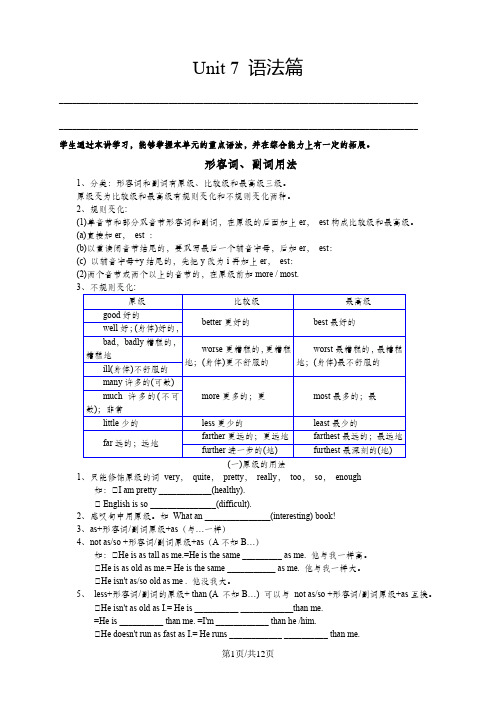
Unit 7 语法篇____________________________________________________________________________________________________________________________________________________________________学生通过本讲学习,能够掌握本单元的重点语法,并在综合能力上有一定的拓展。
形容词、副词用法1、分类:形容词和副词有原级、比较级和最高级三级。
原级变为比较级和最高级有规则变化和不规则变化两种。
2、规则变化:(1)单音节和部分双音节形容词和副词,在原级的后面加上er,est构成比较级和最高级。
(a)直接加er,est :(b)以重读闭音节结尾的,要双写最后一个辅音字母,后加er,est:(c) 以辅音字母+y结尾的,先把y改为i再加上er,est:(2)两个音节或两个以上的音节的,在原级前加more / most.1、只能修饰原级的词very,quite,pretty,really,too,so,enough如:①I am pretty ____________(healthy).① English is so _______________(difficult).2、感叹句中用原级。
如What an _______________(interesting) book!3、as+形容词/副词原级+as(与…一样)4、not as/so +形容词/副词原级+as(A不如B…)如:①He is as tall as me.=He is the same _________ as me. 他与我一样高。
①He is as old as me.= He is the same ___________ as me. 他与我一样大。
①He isn't as/so old as me . 他没我大。
八下英语第二单元重点
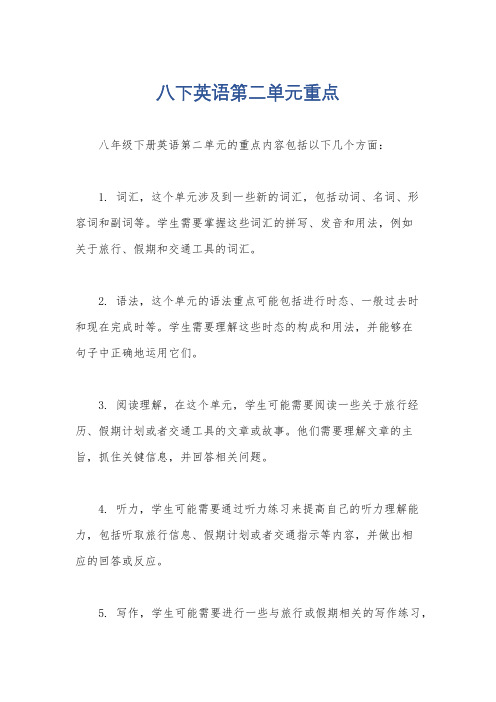
八下英语第二单元重点
八年级下册英语第二单元的重点内容包括以下几个方面:
1. 词汇,这个单元涉及到一些新的词汇,包括动词、名词、形
容词和副词等。
学生需要掌握这些词汇的拼写、发音和用法,例如
关于旅行、假期和交通工具的词汇。
2. 语法,这个单元的语法重点可能包括进行时态、一般过去时
和现在完成时等。
学生需要理解这些时态的构成和用法,并能够在
句子中正确地运用它们。
3. 阅读理解,在这个单元,学生可能需要阅读一些关于旅行经历、假期计划或者交通工具的文章或故事。
他们需要理解文章的主旨,抓住关键信息,并回答相关问题。
4. 听力,学生可能需要通过听力练习来提高自己的听力理解能力,包括听取旅行信息、假期计划或者交通指示等内容,并做出相
应的回答或反应。
5. 写作,学生可能需要进行一些与旅行或假期相关的写作练习,
比如写一篇关于自己假期计划的短文或者写一封给朋友的电子邮件,分享旅行经历。
总的来说,这个单元的重点是让学生掌握与旅行、假期和交通
工具相关的词汇、语法和表达能力,培养他们的阅读理解和听力理
解能力,同时提高他们的写作能力。
希望这些内容能够帮助你更好
地理解这个单元的重点。
英语八下知识点总结

英语八下知识点总结英语八下的学习内容涵盖了诸多方面,包括词汇、语法、阅读、写作等。
为了帮助大家更好地巩固所学知识,本文将为大家总结英语八下的重要知识点。
一、词汇1.动词短语:本学期学习了大量的动词短语,如:turn off、turn on、get up、go on、put on、take off等。
2.形容词和副词:掌握了一些常用的形容词和副词,如:happy、sad、tall、short、fast、slow等。
3.名词:学习了各类名词,包括人物、动物、物品、地点等,如:teacher、doctor、policeman、student、cat、dog、pen、pencil、school、park等。
二、语法1.现在进行时:表示正在进行的动作或状态,如:I am watching TV.2.一般将来时:表示将来要发生的动作或状态,如:I will go to the park tomorrow.3.现在完成时:表示过去发生的动作对现在造成的影响或结果,如:I have finished my homework.4.情态动词:学习了can、may、must等情态动词的用法,如:Can I go out now? May I come in?三、阅读1.短文阅读:通过阅读短文,提高阅读理解能力,掌握文章的主旨大意。
2.故事阅读:学习了一些有趣的故事,如《灰姑娘》、《小红帽》等。
3.信息匹配:根据文章内容,完成相应的信息匹配题。
四、写作1.书信:学习了书信的格式和写作方法,如:感谢信、邀请信、道歉信等。
2.看图作文:根据图片内容,发挥想象力,完成作文。
3.故事续写:根据给定故事的开头,发挥想象力,完成故事续写。
总结:英语八下的学习内容丰富多样,希望同学们在掌握以上知识点的基础上,多加练习,不断提高自己的英语水平。
同时,也要注意培养良好的学习习惯,如:按时复习、多做练习、积极参加课堂活动等。
初中英语8下知识点总结
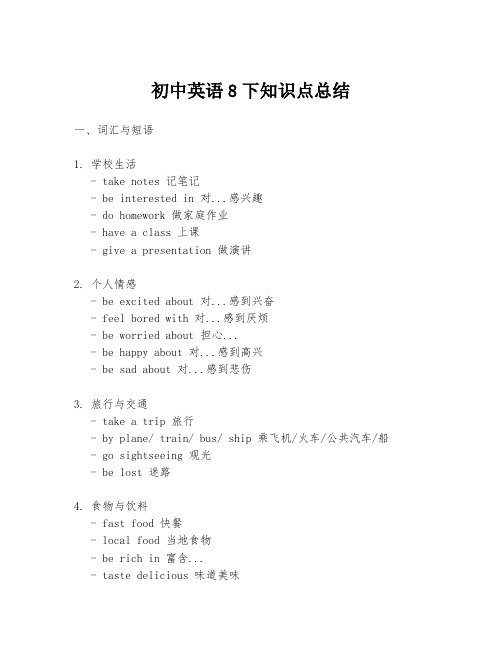
初中英语8下知识点总结一、词汇与短语1. 学校生活- take notes 记笔记- be interested in 对...感兴趣- do homework 做家庭作业- have a class 上课- give a presentation 做演讲2. 个人情感- be excited about 对...感到兴奋- feel bored with 对...感到厌烦- be worried about 担心...- be happy about 对...感到高兴- be sad about 对...感到悲伤3. 旅行与交通- take a trip 旅行- by plane/ train/ bus/ ship 乘飞机/火车/公共汽车/船 - go sightseeing 观光- be lost 迷路4. 食物与饮料- fast food 快餐- local food 当地食物- be rich in 富含...- taste delicious 味道美味- have a meal 用餐5. 健康与运动- keep fit 保持健康- do exercise 做运动- have a cold 感冒- take medicine 吃药- have a check-up 体检6. 环境与自然- protect the environment 保护环境- cut down trees 砍树- pollute the air 污染空气- take care of 照顾- be in danger 处于危险中二、语法点1. 一般将来时- 表示将来的动作或状态。
- 结构:主语 + will + 动词原形 + 其他。
2. 现在进行时- 表示正在进行的动作。
- 结构:主语 + am/is/are + 动词-ing 形式 + 其他。
3. 过去进行时- 表示过去某一时刻正在进行的动作。
- 结构:主语 + was/were + 动词-ing 形式 + 其他。
Unit5课时3GrammarandWriting(学生版)八年级英语下册讲义(人教版)
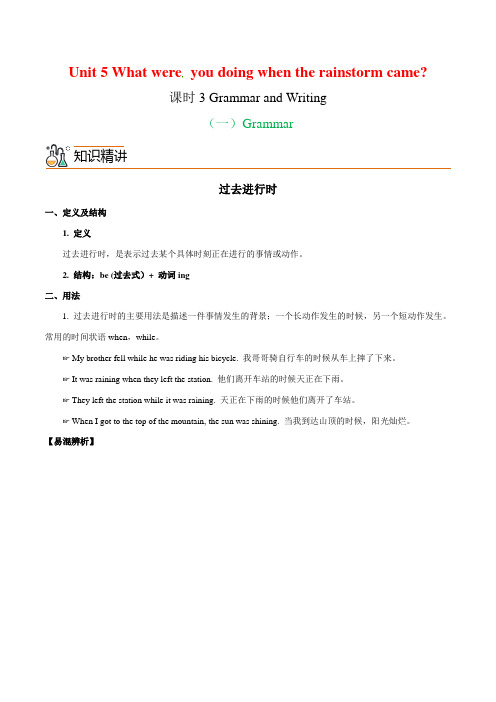
Unit 5 What were you doing when the rainstorm came?课时3 Grammar and Writing(一)Grammar知识精讲过去进行时一、定义及结构1. 定义过去进行时,是表示过去某个具体时刻正在进行的事情或动作。
2. 结构:be (过去式)+ 动词ing二、用法1. 过去进行时的主要用法是描述一件事情发生的背景;一个长动作发生的时候,另一个短动作发生。
常用的时间状语when,while。
☞ My brother fell while he was riding his bicycle. 我哥哥骑自行车的时候从车上摔了下来。
☞ It was raining when they left the station. 他们离开车站的时候天正在下雨。
☞ They left the station while it was raining. 天正在下雨的时候他们离开了车站。
☞ When I got to the top of the mountain, the sun was shining. 当我到达山顶的时候,阳光灿烂。
【易混辨析】when和while的区别(1)when意为"在……时;当……的时候",常指在某个时间点,可表示时间点或时间段,由when引导的时间状语从句,主句用过去进行时,从句用一般过去时。
从句中的谓语动词可以是延续性动词,也可以是瞬间动词。
☞ I was just reading a book when she came into my room. 她走进我房间时,我正在看书。
(2)while意为"当……的时候",只表示时间段,常指某个时间段,由while引导的时间状语从句,主句用一般过去时,从句用过去进行时。
从句谓语动词必须用延续性动词,且多用于进行时态。
强调主句与从句的动作同时发生或主句的动作发生在从句的动作过程中。
☞ While Jim was mending his bike, Lin Tao came to see him. 吉姆正在修他的自行车时,林涛来看他了。
人教版初二(下)英语:unit 5语法篇(学生版)
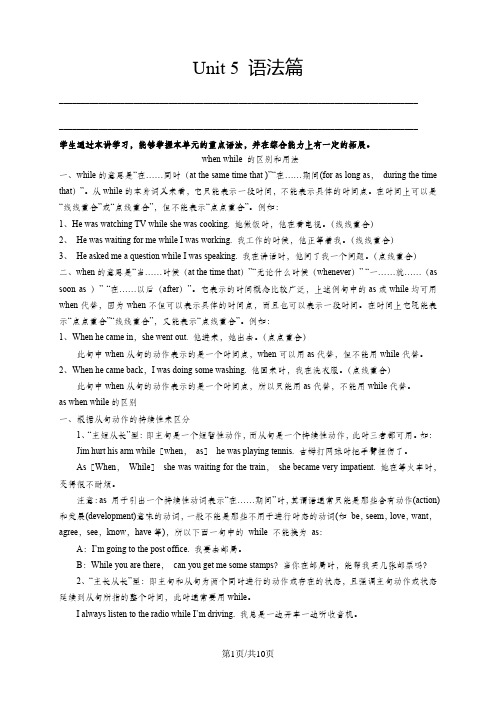
Unit 5 语法篇____________________________________________________________________________________________________________________________________________________________________学生通过本讲学习,能够掌握本单元的重点语法,并在综合能力上有一定的拓展。
when while 的区别和用法一、while的意思是“在……同时(at the same time that )”“在……期间(for as long as,during the time that)”。
从while的本身词义来看,它只能表示一段时间,不能表示具体的时间点。
在时间上可以是“线线重合”或“点线重合”,但不能表示“点点重合”。
例如:1、He was watching TV while she was cooking. 她做饭时,他在看电视。
(线线重合)2、He was waiting for me while I was working. 我工作的时候,他正等着我。
(线线重合)3、He asked me a question while I was speaking. 我在讲话时,他问了我一个问题。
(点线重合)二、when的意思是“当……时候(at the time that)”“无论什么时候(whenever)” “一……就……(as soon as )” “在……以后(after)”。
它表示的时间概念比较广泛,上述例句中的as或while均可用when代替,因为when不但可以表示具体的时间点,而且也可以表示一段时间。
在时间上它既能表示“点点重合”“线线重合”,又能表示“点线重合”。
例如:1、When he came in,she went out. 他进来,她出去。
人教版初二(下)英语:unit 4 语法篇(学生版)
人教版初二(下)英语:unit 4 语法篇(学生版)Unit 4 语法篇____________________________________________ __________________________________________________________________________________ ______________________________________学生通过本讲学习,能够掌握本单元的重点语法,并在综合能力上有一定的拓展。
1.Why don’t you do sth?=why not do sth 为什么不做…?2.在带有till或until引导的时间状语从句的主从复合句里,如果主句用肯定式,其含义是“一直到……时”谓语动词只能用延续性动词。
如果主句用否定式,其含义是“直到……才……”, “在……以前不……”, 谓语动词可用瞬间动词。
例如:The young man read till the light went out(熄灭).Let’s wait until the rain stops.We won’t start until Bob comes.Don’t get off(从下来)until the bus stops. 【Till是指直到某一特定事件发生的时候,而在那个时刻之后,该事情或状况仍将持续。
Until是指直到某一特定事件发生的时候,而讲话的人在自己心里认导。
例如:Though he is young, he knows a lot.Although I am tired, I must go on working.(2) although(though)不能用在同一个句子中。
例如:我们不能说:Though it was raining hard, but he still went out.应该说:Though it was raining hard, he still went out.或It was raining hard, but he still went out.1. I will wait I hear from you.A. untilB. sinceC. whileD.because 2. the work is difficult, all the workers are keeping on working.A. ButB.AlthoughC. AndD. So3. We turned on the light we could see what had made a big noise.A. howB. so thatC. inorder to D.although4. Would you mind him here?A. sitB. sittingC. to sitD. sits5. Music isn't Sally's maininterest, she doesn’t want to go to the concert today.A. butB. soC. orD. and基础演练一、单项选择1. --- This book is a bit difficult.read something easier?--- All right.A. Whynot to B. Whydon'tC. WhynotD. Whynot you2. --- Why don't you music club? --- I'm sorry. I can't sing or dance.A. to joinB. joinC. joiningD. to joinin3. he'stired, he keeps working.A.Although;but B.Although;/C. /;althoughD.But;/4. Mike feels happy every day he is poor.A. ifB. soC.because D.although5. Tom didn't have dinner his mother came back from work.A. whileB. unlessC. untilD. since6. You must work harder andharder you can go to a better college.A. inorder to B. so astoC. thatD. so that7. Lily knows some Chinese, she can read the words on the bottle.A. soB. orC. butD. for8. We need one person to take part in thegame, you hi m.A. both; andB. neither; norC. either; orD. not only; but also9. We didn't know each other at thattime, we're good friends now. A.becauseB. sinceC. butD. if10. I will stay with you the doctor comes to help you.A. afterB. ifC. unlessD. until二、翻译(根据中文提示完成句子)11. 我真的很累因为昨晚我学习到深夜。
八年级英语下册知识点总结
八年级英语下册知识点总结八年级英语下册知识点总结。
Unit 1Where did you go on vacation?1. Where did you go on vacation?2. I went to the mountains.3. Did you go with anyone?4. Yes, I went with my family.5. How was the weather there?6. It was sunny and warm.7. What did you do there?8. I went hiking and took lots of photos.Useful expressions:1. go on vacation。
2. go to the mountains。
3. go with my family。
4. take lots of photos。
Grammar: The past tense of the verb “be” (was/were)。
Unit 2Where is the post office?1. Where is the post office?2. It’s next to the library.3. How do I get to the bookstore?4. Go straight and turn left at the first corner.5. Is there a supermarket near here?6. Yes, there is. It’s across from the park.7. How far is it from here?8. It’s about 10 minutes’ walk.Useful expressions:1. next to。
2. across from。
3. turn left/right。
仁爱八年级下英语知识点
仁爱八年级下英语知识点英语作为国际通用语言,对于现代人的职业发展和日常交流都极其重要。
在仁爱八年级下,我们将从听说读写四个方面,全面学习英语知识点。
语法知识1. 直述句(陈述句)主语+谓语+宾语例句:She loves ice cream.2. 疑问句(一般疑问句)助动词+主语+谓语+宾语例句:Do you like pizza?3. 祈使句(命令句)动词原形+宾语例句:Clean your room.4. 句子成分(主语、谓语、宾语、定语、状语等)例句:The boy with glasses is my friend.口语表达1. 自我介绍例句:Hello, my name is Jack. I am from Shanghai.2. 意见交流例句:What do you think of this movie?3. 问路例句:Excuse me, where is the nearest bank?4. 约会例句:Would you like to have dinner with me tonight?听力训练1. 美国口音和英国口音的区别2. 不同场景下的英语口语表达3. 对话中正确听取数字、时间等4. 听取简单的新闻或者广播等阅读理解1. 阅读基础知识(字母、数字、大小写)2. 阅读简单的短文,了解文章基本内容3. 阅读故事和小说,理解情节和人物关系4. 阅读新闻等实用文章,了解时事信息写作能力1. 自我介绍2. 写日记、周记、月记等3. 写作文,例如:写一篇关于影响健康的因素的文章4. 写简历,求职信等总结仁爱八年级下英语知识点包含了很多方面,包括语法、口语、听力、阅读和写作等,我们需要在日常学习中逐步积累和运用这些知识点。
只有通过反复的练习和实践,我们才能真正掌握英语知识,使其成为我们通往更广阔世界的一把钥匙。
人教版初二(下)英语:unit8词汇篇(学生版)
人教版初二(下)英语:unit8词汇篇(学生版)Succeed: 成功,动词词性Successful:成功的,形容词词性Successfully:成功地,副词词性1. A beginning will lead toa in the end. I hope youwill in your English exam.A. success; successful; succeedB. successfully; succeed; successC. successful; succeed; successD. successful; success; succeed2. 这件红色的衬衫是她的吗?this redblouse her?3. 校长已经向我们介绍新英语老师了。
The headteacher the new English teacher us.4. 《汤姆·索亚历险记》是一个充满乐趣的生动的故事。
The Adventure of Tom Sawyer is a livelystory.5. 快点,否则你上学就要迟到了!, or you'll be late for school!基础演练1. --- Have you ever been to Disneyland?--- No, . I hope I can go there next year.A.always B.sometimesC. neverD. often2. Jack dislike the weather in Beijing in spring, because there is so much wind and sand. But now he it.A. is used to; used toB. used to; is used toC. was used to; is usedtoD. used to; uses to3. The woman who is talking with Mr.Brown be Miss Li. She has gone to England.A. can'tB. mustC. mayD.mustn't 4. --- Your English is good.--- Thank you. I it for three years.A. learnB.learned C. havelearnedD. hadlearned5. The government of Linyi isbuilding cheap and good houses for the people.A. thousand B. thousandsC. thousand ofD. thousands of6. Yao Ming was famous playing basketball.A. toB. asC. forD.between 7. --- What do you think of Sanya?--- Oh, it's a beautiful city,I there for several times.A. havebeen B. havebeen toC. havegone toD. havebeen in8. My mother us stories when we were children.A. was used to tellB. is used to tellingC. used to tellD. used to telling9. I was in the US, I made a lot of American friends.A. WhileB.AlthoughC. UnlessD. Until10. I have seen such a beautiful village anywhere in the world.A. everB. neverC. stillD. hardly11. That man be my English teacher. He has gone to Canada.A.needn't B.mustn'tC. can'tD.shouldn't12. The man tried several times to start the car, and he succeeded .A. in thepast B. in theendC. at firstD. at once13. --- I've never had such a wonderful time. Thank you for inviting me.A. That's right.B. You're welcome.C. That's it.D. Good job.14. Do you know that the earth is hometo animals?A. millionB.millions C. millionofD.millionsof巩固提高1. (快点), or we will not catch the early bus. (词数不限)2. The book is so interesting that Icouldn't it (放下).3. Last summer holiday I picked up a lot of colorful shells (在沙子里). (词数不限)4. There are (至少) 5 words in this sentence. (词数不限)5. (多久) have you been an engineer? (词数不限)6. The noisy music is (一个醒来的好方法). (词数不限)7. Tom and his parents often (争吵) small things. (词数不限)8. The song (充满感情的) reminds me of my old father in the mountain village.(词数不限)9. As time went on, he (逐渐意识到) his mother's love to him. (词数不限)10. The boy took part in manyclubs, (例如) singing club and basketball club.(词数不限)11. Can you tell me (…的数量) the students in your class? (词数不限)12. They have finished fivetasks (在一天结束的时候). (词数不限)一、单项选择1. --- Are these books yours, Mike?--- No, they aren't. They belongto .A. himB. hisC. hersD. she2. There are soccer fans in the world.A. millionB. three millionsC. million ofD. millions of3. --- Hello! Could I speak to Lily?--- Sorry, she is not in.She Shanghai.A. havebeen to B. havegone toC. hasbeen toD. hasgone to4. Liu Huan is a famous singer, butCindy to any of his songs yet.A. listenB. doesn't listenC. has listenedD. hasn't listened5. --- MissBrown out all of her records? --- No, not yet.A. Have;sold B. Has;soldC. Does;sellD. Is; sell6. People often use it ships.A. buildB. buildsC. tobuild D.building7. --- Lily, why are you still here? School is over for half an hour.--- Because I my task yet. I still need one more hour.A. won't finishB. didn't finishC. haven't finishedD. hadn't finished8. When they arrived the island, they were all attracted by its beauty.A. atB. inC. onD. to9. --- Hurry up, you will be late for school.--- OK. I'm coming.A. andB. butC. orD. so10. --- Mr. Li, I can't understand everything in class.--- Don't worry! I'll the main points at the end.A.record B.receiveC.requireD.remember二、完形填空It was my first day at Grade 6. And the first lesson was 11 English. When I was doing nothing, Mr. Gough, our new English teacher, 12 into the classroom.To my surprise, he held up a book, The Collected Works of Edgar Allen Poe, and asked if anyone13 it. I put my hand up, because Poe was my favorite writer. Mr. Gough asked if I really understood 14 the author tried to say in his book. My reply made him smile, and he asked me 15 an essay on that subject.After that, English classes became a new interest for me. Mr. Gough thought that students had to 16 a play to understand it. "Don't just read it," he said.As time passed, we developed a real friendship. He encouraged me to be a 17 in the future. When I left school, he said to me, "You have a gift for writing, Tony, and one day you'll come to realize how 18 it is. Make use of it if you want your life to be complete."19 have passed. Now, every time I sit down to write 20 , I think of Mr. Gough. He was more than just an English teacher, because he also taught me useful lessons in life.11 . A. boringB.bored C. interestingD. interested12 . A.walks B.walked C.waswalkingD.iswalking13 . A.reads B.read C.hasreadD.hadread14 . A.if B.when C.what D.how15 . A.wrote B.writing C.to write D.written16A work B act out C put out D come. . out . . . out17 . A. teacherB.actor C.waiter D.writer18 . A.useful B. beautifulC.careful D. thankful19 . A.AyearB.SomeyearC.Years D.Everyyear20 . A. anything newB. something newC.newanythingD.newsomething____________________________________________ _________________________________________________________________________________ _____________________________________一、单项选择(江苏省苏州市工业园区初二下期中考试)1. Li Na plays tennis very well. She has become first Asian woman to reach a Grand Slam (大满贯) final.A. a; theB. /; theC. the; aD. /; a2. Last week I a cold. Since last week, I a cold.A. have had; have hadB. caught; have hadC. have had; havecaught D. caught; havecaught3. The CD-ROM which has eight floors last night.A. wascomeout B. wascameoutC. cameoutD. is comeout4. The character in this filmis boy.A. an 11-year-oldB. an 11 years oldC. a 11-year-oldD. a 11-year old5. It is impolite for students in class. They must listen to the teacher carefully.A. to be sleepB. to fall sleepC. to sleepingD. to fall asleep6. I hope my father ask me about my marks after every exam.A. notB. not toC. won'tD. don't7. --- Have you finished yourhomework ?--- Not . I was playing computer games.A. yet;already B.already;yetC. yet; yetD. yet;ever8. The farewell party with the song loved by all the students there.A. beginsB. wasbegun C. began D. isbeginning9. The changes the environment have brought many benefits.A. toB. ofC. forD. on10. I must say that it's the best modelI .A. sawB. seeC. haveseenD. will see11. We do believe green house effectdoes to our environment.A.harmful B.harmlessC. harmD. harms12. My parents twenty years ago. They for twenty years. We willcelebrate their twenty yearsof this Sunday.A. have been married; got married; marriedB. got married; have been married; marriageC. got married; have been married; marriedD. have got married; were married; marriage13. This kind of pens out in this shop, because they well.A. sells; are writtenB. is sold; writeC. are sold; arewrittenD. sells; write14. This book three main stories, and every story has a surprising ending.A.including B.includesC.includeD. isincluded15. --- I'm too nervous to give a talk in front of so many people.--- , Lucy. You can do it.A. Comeon B. That'sgreatC. You'rerightD. That'strue二、完形填空Like many other girls who are 17 years old, Maria Sharapova likes to go shopping, talk with friends and read Harry Potter Books. But she is very different 16 some ways.The Russian tennis player is one of the richest sportswomen in the world.She can 17 100 million dollarsa year. This year Sharapova has not only18 five big games but also been19 lots of fashion magazines. Will she let money and fame(名声) 20 the way she lives?"I know things will come up, and I21 to keep my head cool. I leave business for other people. I just want to go out and play tennis," she said. Sharapova has strict22 for herself. When she is not playing games, she usually practices for two hours each day 23 she stays fit.She goes to school using the Internet. Her mother 24 her textbooks into pieces, so she doesn't have to25 many pages with her. She takes just three courses a year, doing homework a few times a week."I'm not really in a hurry," she said, "I've always been learning by myself."16 . A.in B.on C.at D.by17 . A.make B.run C.hold D.set18 . A.got B. ownedC.won D. received19 . A.in B.on C.at D.of20 . A.fill B.fix C.stop D.change21 . A.want B.like C.try D.have22 . A. programB.plan C. practiceD.way23A if B so C D but. . . . because .24 . A.breaks B.cuts C. knocksD.hits25 . A.bring B.leave C.take D.keep三、阅读理解AThere are four parts in IELTS: listening, speaking, reading and writing. Listening is very important. Are you confident? Have you made good preparation? The book IELTS Listening is helpful for your preparation for IELTS.Car and Driver is the world's most popular automotive magazine. It provides information and entertainment for people who like cars. It offers the best vehicle tests in the business. The magazine alsocovers the latest developments incar technology.Once you own the book, you will become a good speaker. Susan Weinschenk's excellent ideas on how to make a perfect speech are very helpful to you. With the help of the book, you will be confident to know how to give your speech. Also, you will learn how to attract your audience during the speech.The book offers healthy and delicious food. These dishes can all be completed in less than half an hour, and in many cases, in just a few minutes. Sisson and Meier show you how to delight your family or guests every time with quick, delicious meals using local materials, meats, healthy fats (yes, and real butter) andcommon herbs and spices.26. Which of the following will help to improve your speech?A. IELTS Listening.B. Car and Driver.C. Quick & Easy Meals.D. Designing Effective Speech Interfaces.27. Who will probably be interested in Quick & Easy Meals?A. Car fans.B. English speakers.C. Housewives.D. Businessmen.28. How many of the four short passages are introductions of magazines?A. One.B. Two.C. Three.D. Four.BSongkran is a time for cleaning, symbolized(象征) by the throwing of water. Songkran starts on April 13 every year and lasts for three days. We call it "Thai New Year".Thai New Year is a good time for all children to show how much love they have for their parents. In this holiday children give flowers to their parents and then pour some water to their parents and thenpour some water on their parents' hands. Songkran is also known as the "Water Festival" because people believe water will wash bad luck away.At that time people usually return home to visit their families and spend time together. People also do many fun things. For example, they joyfullysplash(泼) water on each other, watch the Miss Songkran Contest. And some spend their holiday relaxing at travel spots. All of Thailand is full of travelers and their families to enjoy the water festival.29. Thai New Year finishes on .A. April12 B. April13C. April14D. April1530. Children pour some water on their parents' hands because .A. their parents' hands are very dirtyB. they love their mother very muchC. their parents enjoy the Water FestivalD. they believe water will wash bad luck away31. Which of the following is not mentioned in the article?A. Songkran is a holiday for Thai people.B. Children give flowers to their parents forthis holiday.C. People also pour milk on others in thisholiday.D. Songkran is a holiday for children to showtheir love to their parents.32. In Thailand, peopleusually during the New Year.B. relax at travel spots A. go to visit theirfamiliesD. A and BC. work hard in thecityCA passenger(旅客) told an air hostess that he needed a cup of water to take his medicine when the plane just took off. She told him that she would bring him the water in ten minutes.The air hostess was kept so busy that she forgot to give him the water. As a result, the passenger was held up (延误) to take his medicine. Thirty minutes later, when the passenger's ring forservice sounded, she hurried over to him with a cup of water, but he refused.In the following hours on the plane, each time the air hostess passed by the passenger, she would ask him with a smile whether he needed help or not. But the passenger never answered a word.When he was going to get off the plane, the passenger asked the air hostess to hand him the passengers' booklet(小册子). She was very sad. She knew that he would write down sharp words, but with a smile she handed it to him.Off the plane, she opened the booklet, and smiled, for the passenger put it:"On the flight, you asked me whether I needed help or not for twelve times in all. How can I refuse your twelve sincere smiles?"That's right! Who can refuse twelve sincere smiles from a person?33. Ten minutes later, the passenger didn't get the water because .A. the plane didn't take offB. the air hostess was kept busy and forgot itC. it wasn't allowed to take medicine during theflightD. there wasn't enough water on the plane34. The underlined word "it in Paragraph 4 refers to (指的是) the .A.medicine B. water C. cup D.booklet35. At last the passenger was .A. satisfied with the air hostessB. unhappy with the air hostessC. angry at what the air hostess had saidD. too tired to blame the air hostessDFarmer John and farmer Bob were neighbours. For more than 30 years, they had been getting along very well.Then their good relationship(关系) broke. It began with a small thing, then bitter(尖刻的) words, and then weeks of silence. One morning farmer John woke up to find a stream(水沟) between the two farms. "It must be Bob," John thought.Then one day there was a knock on John's door. He opened it to find a carpenter(木匠) standing at the doorway."I'm looking for a few days' work," the carpenter said."I do have a job for you," John said, "Look across the stream at that farm. That's my neighbour Bob. He dug(挖) a stream between the two farms. I want you to build a fence(篱笆)—an 8-foot fence. I don't want to see his place or his face any more. I don't have such a neighbour."The carpenter said, "I think I know what to do, sir, and I'll be able to do a job that pleases you."Farmer John helped the carpenter get materials ready and then he was off for the day.About sunset when the farmer returned, the carpenter had just finished his job. The farmer's eyes opened wide. There was no fence there at all!It was a bridge! And the neighbour, Bob, was coming across, with his hand out-stretched(伸出), "Hi, John! You're quite a fellow to build thisbridge!"Then they met in the middle, taking each other's hands. "I'm terribly sorry for what I have said and done. We should be good to each other," said farmer Bob.Then they turned to see the carpenter, who was ready to go. No, wait! Stay a few days. I have a lot of other jobs for you," said farmer John. "I'd love to stay," the carpenter said, "but I have more bridges to build."36. Just before the carpenter came, John andBob each other for weeks.A. hadn't spoken toB. were friendly toC. had fought withD. had bitter wordswith37. Farmer John asked the carpenter to build a fence because .A. he wanted to protect his farmB. he didn't want to do it himselfC. he wouldn't like to see BobD. he wanted to find him something to do38. Who built the bridge over the steam between Bob's and John's?A. The carpenter.B. Bob.C. John.D. John's friend.39. What does the sentence "You're quite a fellow to build this bridge!" mean?A. John was good at building bridges.B. John was great to build this bridge.C. John was silly to build such a bridge.D. John should build the bridge earlier.40. What do you think will happen in the end?A. The carpenter will stay to do other jobs.B. Farmers Bob and John will build morebridges.C. The two farmers will build a fencethemselves.D. Farmers Bob and John will make friendsagain.。
- 1、下载文档前请自行甄别文档内容的完整性,平台不提供额外的编辑、内容补充、找答案等附加服务。
- 2、"仅部分预览"的文档,不可在线预览部分如存在完整性等问题,可反馈申请退款(可完整预览的文档不适用该条件!)。
- 3、如文档侵犯您的权益,请联系客服反馈,我们会尽快为您处理(人工客服工作时间:9:00-18:30)。
初二下册英语知识点总结Unit 1 Past and present1. I used to go to school by bike.used to do sth.是一个固定结构,意思是“过去经常做某事”,后面用动词原形,表示过去的某种经常性、习惯性的行为或者动作,并意味着这种动作目前已经不存在。
【拓展】(1) be used to do something意思是“被用来做某事”,是动词短语use …to do的被动语态结构。
例如:(2) be used to doing something意思是“习惯于做某事”,to后接动词-ing形式。
例如:2. Yes, I’d like to.would like意为“想要”,语气非常委婉。
具体用法如下:(1)would like后接名词或代词,表示“要”某样东西。
(2)would you like后接动词不定式(to do形式),表示意愿、喜爱,常用于有礼貌地提出邀请、请求或建议。
(3)would like sb. to do sth. 意为“想要某人做某事”。
【注意】它的肯定回答多用Yes, please./Yes, I’d(We’d) like (love) to./Certainly./Yes, thank you.等;I’d love /like to.的to不能省略。
否定回答常用No, thanks./No, thank you.等。
3. I hope I can visit it again.本句是hope 后加了一个宾语从句,省略了连接词that。
hope有如下用法:(1) 从说话语气上讲,hope 用于表示可能实现的事情,后接从句时,用陈述语气。
(2)从含义上讲,hope 多用于指对好事的盼望、预想;对坏事的预想则多用“I’m afraid...”。
(3) 从时间上看,hope 所希望的一般指将来或现在的事情,不用于指过去的事情。
(4) 从句型上看,hope 可用hope to do sth.句型,而不能用hope sb. to do sth.句型。
(5) 要表示“希望如此”时,常用“I hope so.”其否定形式用“I hope not.”。
hope后面还可以接that 从句,意为“希望……”。
4. The new shopping mall is a good place to have fun.句中动词不定式短语to have fun作定语,修饰place。
动词不定式短语作后置定语,可修饰名词、符合不定代词等。
5. I spend more time on my homework than before.spend是动词,意为“花费(时间或金钱)”。
其过去式为spent。
用法如下:时间/金钱+ (in) doing sth. 花费时间或金钱做某事spend +时间/金钱+ on sth. 花费时间或金钱在某物上拓展:表示“花费”的spend、take、cost和pay的辨析:Unit 2 Traveling1. My parents and I left for the airport in the early morning.leave作动词,意为“离开(某处)”,常与for连用,后接要去的地方。
leave的过去式和过去分词都是left。
【拓展】(1)leave还意为“离开(某人)的身边;离弃”。
(2)动词短语leave something at/in +表示地点的名词,意为“把某物忘在某地”。
(3)leave还意为“听任,使处于某种状态”。
2. My dad has been to Chengdu on business twice.have been to+地点名词,表示“曾经去过某地”,但现在不在那里, 后可接次数,如once,twice,three times等,表示“去过某地几次”,也可和just,never,ever等连用。
【拓展】have gone to和have been to是现在完成时的两个典型句式。
have gone to+地点名词, 表示“去了某地”,可能已经达到或者在路途中,不在说话的现场。
如果have gone to后接地点副词时,要省略to。
3. I see Andy playing on the sand too.see sb. doing sth.意为“看到某人正在做某事”(表示正在进行的动作)。
【拓展】辨析see sb. doing sth.与see sb. do sth.see sb. doing sth.意为“看见某人正在做某事”,强调动作正在进行。
see sb. do sth.意为“看见某人做过某事”,强调动作自始始终的全过程。
4. At the end of the day, we watched the fireworks…(1)end 作为不及物动词,意为“结束;终止”,其主语通常是物。
(2)end 作为及物动词,意为“结束;终止”,其主语通常是人。
(3)end 作为名词,意为“结束;结尾”。
常用于句型:at the end of意为“在……末尾”。
5. What do you think was the best part of the day?do you think作插入语,其位置较为灵活,可以放在句首、句中或句尾,在句尾时,常用逗号隔开,在句首时,要用陈述句语序。
Unit 3 Online tours1. how oftenhow often意为“多久一次”,常用于对时间频率的提问。
【拓展】2. It looks like a TV.look like意为“看起来像……”应用范围最广,除了描述人、物之外,也能抽象表达事件或现象。
【拓展】(1)What does/do sb/sth look like? 这个句式是询问某个人或物的外貌特征。
(2)be like意为“像……”。
3. I agree.本句中的agree常见用法如下:(1)agree单独使用,表示“同意、答应”等。
(2)agree with表示“同意;赞成”,常用搭配为:agree with +sb. / what sb. said ?(3)agree to表示“同意;赞成(提议、安排、计划等)” 。
(4)agree to do sth“同意做某事”。
4. Have you noticed the “tour” icon at the top of the page?(1)此处noticed是notice的过去分词。
notice此处用作及物动词,意为“注意,注意到”。
notice 后可以接名词,也可以接从句。
(2)notice作动词,意为“注意到,留心,看到”。
常用于notice sb. do sth.和notice sb. doing sth.结构中。
5. Have you ever dreamt of travelling around the world without passport?dreamt是dream的过去分词,dream 此处用作动词。
dream作动词时常用于dream of/about结构中,主要有以下含义:(1)做梦,梦见,梦到。
(2)向往,渴望,想象。
【拓展】dream 作名词,意为“梦,愿望,心愿”等。
6. Would you mind showing me how to start this online tour?Would you mind doing sth.? 这一句型通常用来表示请他人做某事,常意为“可否请你做……”或“劳驾你做……”。
如果同意、不反对别人做某事,答语用否定形式;例如:Of course not. / Certainly not. 等。
如果不同意、反对别人做某事,答语用肯定形式。
一般多用I am sorry...或I’m afraid...等以缓和语气。
【拓展】(1)Do (Would) you mind if...句型用来表示请求对方的许可,即询问对方“是否介意(说话人)做某事”。
答语与Would you mind doing sth.?相同。
(2)mind作可数名词,意为“脑子;想法;记性”。
(3)mind的常用短语:change one’s mind 改变主意make up one’s mind 作决定keep...in mind 记住never mind 不要紧Unit 4 A good read1. Have you decided what to do with these books, Hobo?what to do是“特殊疑问词+动词不定式”,在句子中作动词decided的宾语。
相当于特殊疑问词引导的宾语从句。
【拓展】疑问词what,which,how,where,when等可以和动词不定式连用,构成不定式短语。
“疑问词+动词不定式”可以做主语、宾语、表语等。
“疑问词+动词不定式”可以由名词从句简化而来。
2. I’m interested in history books.be interested in…结构,意为“对……感兴趣”,后面跟名词或动名词作宾语。
【拓展】辨析:interesting 与interested这两个词都是形容词。
interesting表示某物本身有趣,强调主动,在句子中可以作定语、表语,多用来修饰物。
interested着重于被动意义,其主语一般是人。
常做表语,后接介词in,一起构成be interested in…结构,意为“对……感兴趣”。
例如:3. After our ship crashed against the rocks, I swam as far as I could.as…as one can/could表示“尽某人所能……”,相当于as…as possible。
4. I shouted at them—the loud noise made them all fall over.make在此处是使役动词,后接省略to的动词不定式,make sb. do sth.意为“使/让某人做某事”,类似的动词还有let,have等。
被动语态中,为sb. be made to do sth.,意为“某人被迫做某事”。
【拓展】make作“使……”讲时,还可用make + 宾语+ 形容词/名词(作宾补),即make sb. / sth. + adj./n.。
类似的词还有keep等。
5. Sandy is wondering where to ask for help.wonder作及物动词,意为“想知道;对……感到怀疑”,常见的用法有:(1)后接who, what, why, where 等引导的宾语从句。
